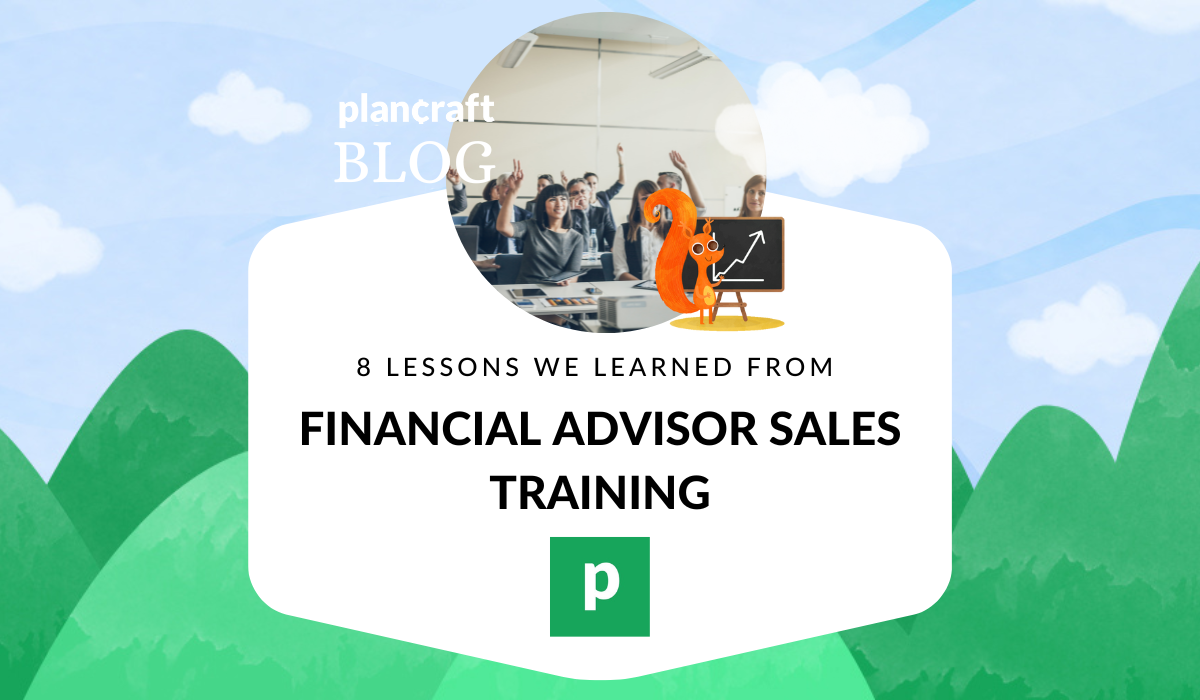In the realm of financial planning, where the pursuit of ideal clients is a thrilling journey, having superior sales skills is your most reliable compass. I'm here, a proud member of a team that has been offering the best sales training for financial advisors. We have been the silent partners behind many advisors, helping them navigate through the oceans of opportunities, enhancing their sales performance, and ensuring their vessels are laden with golden nuggets of wisdom.
We’ve seen, learned, and experimented a lot over the years, and we’ve identified some crucial elements that could turn the tide for any financial advisor aiming to ride the waves of success. Whether it’s about sharpening your sword of marketing strategies or tuning your compass to find your ideal clients, our training programs have been the lighthouse guiding countless advisors safely to the shores of prosperity.
And now, we’re here to share a treasure trove of knowledge with you! This blog is a distillation of valuable lessons, insights, and proven strategies we’ve accumulated over years of training and experience. It’s like a map, leading you to undiscovered territories and hidden treasures in the world of financial advising.
So, come aboard as we sail through the 8 golden pieces of wisdom we’ve garnered, each one a sparkling gem aimed at polishing your sales skills and enhancing your journey in the fascinating world of financial planning!
1) Build Rapid Rapport and Earn Trust
Building rapport with clients is like weaving golden threads into the fabric of your client relationships. It's the foundation, the solid ground upon which flourishing professional connections are built. When advisors and clients share a bond of trust, it’s like a secret handshake, allowing a seamless exchange of ideas, needs, and solutions.
How do you do it? We wrote a whole blog about that (actually, there’s two) which you should definitely check out. Here’s some fast tips in case you don’t have the time:
- Ask open ended questions
- Be an active listener
- Be transparent and authentic.
2) Understand Clients’ Needs
If you’re going to earn their trust, you’ll need to understand their needs profoundly. To build trust, you have to walk a mile in your clients’ shoes, embracing a profound understanding of their financial wishes and concerns. Cold calling and other strategies aren’t about selling financial services or giving unsolicited financial advice. You must present tailored solutions only when you truly comprehend what your clients are seeking.
Successful financial advisors know this well; it’s not about pushing a product or a service. It’s about unraveling the client's financial tapestry, identifying the threads that need attention, and weaving in solutions that align perfectly with their aspirations and needs. When clients feel heard and understood, a trust is not far behind, paving the way for lasting, fruitful relationships.
3) Hone Your Communication Skills
A natural progression from understanding your clients' needs is refining the way you communicate. Excellent communication is pivotal for business growth, especially in a realm inundated with high net worth individuals who are often pressed for time. To unlock their needs and preferences, advisors must be succinct, clear, and impactful in every interaction.
Being savvy with social media and other contemporary communication platforms is equally critical. It's not just about transmitting your message; it's about engaging in meaningful dialogues and creating resonances that reinforce trust and reliability. A robust financial advisor sales training program can provide the necessary tools and insights to navigate the intricate landscape of client communication effectively, ensuring that every interaction is a step towards a stronger advisor-client relationship.
4) Learn to Overcome Objections
Overcoming common sales objections is an integral part of any sales process. Financial planning sales training teaches advisors to view objections not as roadblocks, but as opportunities to clarify, educate, and reinforce the value you bring to the table.
By mastering this skill, advisors can alleviate concerns, build stronger relationships, and move seamlessly through the sales process, converting uncertainties into mutual understandings and, eventually, agreed-upon actions. In this light, each objection is a step closer to a more informed and confident client, willing to entrust their financial future to your guidance.
5) Craft Clear Value Propositions
In our financial sales training, we learned it’s really important to be able to tell people clearly and simply what you can do for them. This is what we call having a clear value proposition.
A value proposition is like a promise. It tells potential clients how you can help them, what benefits they will get, and why they should choose you over other sales reps. It’s your chance to show how you are different and better than other financial advisors.
Simply saying “I can help you manage your money better so you can reach your dreams faster” might not do it. Instead, once you’ve understood the client’s specific needs, offer a specific solution that will ensure they’re met.
When you can say what you offer in a clear and simple way, people are more likely to trust you and want to work with you. It makes them see you as the right person to help them with their money.
6) Learn to Close Like a Pro
“Closing the deal” is like finishing a good book—you’ve worked hard to get to the end, and now it’s time to wrap it up nicely. But sometimes, it’s easier said than done, right? That’s where smart closing techniques from our financial services sales training come into play.
Learning how to seal the deal is a crucial part of business development. It’s about helping your clients say “yes” to the awesome services you offer. It’s like you’re giving them the final nudge they need to make a great financial decision.
When you know how to close effectively, it means you’ve listened well, addressed concerns, and showed your client why your services are the best fit for them. And guess what? This can turn a “maybe” into a solid “yes” more often! Keep practicing these techniques, and watch how they can transform your conversations and your business!
7) Manage Time Wisely
Ever feel like there’s never enough time in the day? You’re not alone. Managing time wisely is like having a superpower in the world of financial advising.
Getting things done efficiently means you can help more people and, yes, earn more too! It’s all about organizing your day smartly, focusing on what really matters, and not letting the small stuff bog you down.
Think about it like this: the more streamlined and focused your day is, the more clients you can assist. And more happy clients mean a more successful business. So, learning how to be a time management superstar can really make your day shine! Keep refining your routines and see how much more you can achieve!
8) Prospect Efficiently
As a financial advisor, prospecting is a crucial part of your business. Making sure you do so effectively, however, could be the difference maker for your success. Sure, you could do the usual—attend networking events, make calls, or use social media. But, why not make life easier?
This is where Planswell comes into play. It’s not just about getting names and numbers. Planswell helps you find people who are actually interested in what you offer. Every Planswell prospect you call has already filled out a financial survey to build a financial plan—they want to know how to retire more comfortably and need you to help make it happen for them.
Put These Lessons Into Practice
Our journey and extensive experience in financial advisor sales training have allowed us to glean invaluable insights. Through varied case studies, we have seen firsthand the immense difference effective sales training can make in an advisor's practice. It not only empowers them to be the decision maker in steering client conversations but also in establishing robust, long-lasting relationships with clients.
It’s through these cultivated relationships that advisors can truly understand the needs, preferences, and goals of their clients, paving the way for mutual success. By incorporating these learned sales skills—building rapport, understanding client needs, effective communication, overcoming objections, and clear value propositions—financial advisors can significantly enhance their sales performance, client satisfaction, and, ultimately, their business growth.
Financial Advisor Sales Training FAQs
Do you need to be good at sales to be a financial advisor?
Being proficient in sales is a significant component of being a successful financial advisor. While core knowledge of finance, economic trends, and market behavior is crucial, the ability to attract and retain clients is what differentiates a thriving advisor from an average one. Every interaction, from initial meetings to regular check-ins, involves selling your knowledge, skills, and services, often in a highly competitive market.
However, being good at sales doesn’t mean being pushy or aggressive. It means effectively communicating value, building and maintaining trust, and demonstrating a clear understanding of your clients’ needs and goals. A financial advisor’s “sale” is more about fostering relationships and less about transactions. It’s about persuading clients that following your advice will lead them to their financial goals and showing them that their success is your priority.
How can I get better at financial sales?
The best way to get better as a financial advisor is to get more comfortable with your sales pitch. If you can match genuine active listening with authentic, engaging value propositions to show potential clients that you have their best interest at heart, you’ll earn more business and keep it.
How do I sell myself as a financial advisor?
Selling yourself as a financial advisor requires you to be yourself. That means engaging authentically with every prospect you interact with. Ask open ended questions, listen actively, and share some fun tidbits about yourself while you’re at it. If you can make your meetings feel more like informal coffee chats, prospects will be much more likely to want to come back for the next one.







.png)

